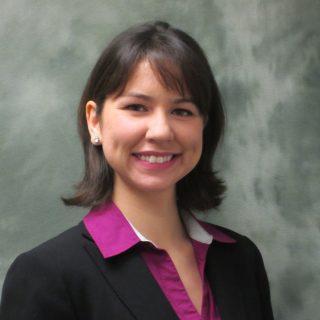
We hope you are enjoying our series on Millennials in the government contracting industry and that it’s raising some interesting questions, and – just maybe – sparking some meaningful debate on the generational divide in the workforce.
Our next Millennial Maverick is Jenny Madorsky, a Program Analyst at SRA International. Jenny graduated from Duke University in 2012 with a B.S.E. in mechanical engineering and a “Best Actress” award for her work as a theater studies minor student.
Right off the bat, it’s clear that Jenny is different perhaps, even from her Millennial peers. Our industry doesn’t see too many engineer/actors, but this duality helped Jenny launch her career.
“Upon graduation, I had several job offers to choose from—a fact for which I was extremely grateful as I watched many of my peers struggle to land a single interview,” she said. “I attributed my fortune to my dual-pronged education — an engineering degree to give me credibility as an analytical problem solver, and a performance arts minor which gave me the skills and confidence to present myself as a desirable candidate. When asked during an interview for a Sales Engineering position, how I would describe myself in one word, the answer that shined bright in my mind was ‘Actress’. The interviewer then presented me an obvious, but difficult question: ‘So why are you here and not auditioning for shows?’”
It turns out that the interviewer’s response was the perfect question to describe the unprecedented – and often misunderstood – nature of the Millennial generation.
“The answer to this question is tricky and, in my opinion, paints a representative picture of the Millennial mindset,” said Jenny. “One of my theater professors once told me, ‘People forget that to act means to do. It doesn’t mean to fake or to pretend, it means to decide to do something real.’ And that’s exactly how I approach my career.”
Even off the stage, Jenny’s theater minor is serving her well. “Though I may not be performing lead roles in theater shows, I choose to take on leading roles at work,” she said. “I envision the character I want to be, define my motivations and obstacles, and take on the role to achieve my personal and professional goals. As a result, within the first year of my career I was trusted with opportunities to lead multi-million dollar proposal efforts, brainstorm and implement technical ideas that now impact the way our company does business, and share my insights with the top-most leadership in our organization. My drive to act within my company earned me the ‘Rookie of the Year’ award—a title given to an employee in the first year of her career that displays leadership promise.”
We asked this award-winning “Rookie” for her insight into what it means to be a Millennial in today’s workforce.
WashingtonExec: When you think about the Millennial generation, what comes to mind? What positive and negative stereotypes surround Millennials, and are these stereotypes warranted?
Jenny Madorsky: I think my own understanding of acting is representative of the Millennial attitude toward work. We want to contribute to something real—something that results in tangible changes to our world and society. Having grown up with the Internet at our fingertips, it seems preposterous to us that it takes so long to make changes when everyone is well-aware of a problem. Having adapted social networking and collaboration technologies and tools, it’s unthinkable that the government should shut down for half of a month because an agreement can’t be reached. We operate with an Agile mindset—we collaborate often, value interaction over process, and we respond to change more readily than following a pre-determined plan. The word “entitled” is often attributed to the Millennial generation, but I argue that we expect more from the world, because we are ready to give more to the world.
WashingtonExec: What do you think are the biggest differences between Millennials and other generations – professionally and personally? What sets Millennials apart?
Jenny Madorsky: I hesitate to speak for an entire generation when I know that in my experience, no two “Millennials” are exactly alike. Part of what, I think, unites us as a generation is a core belief and understanding that stereotypes and broad generalizations only cause harm. It is no longer socially acceptable to not fight vehemently against sexism, racism, and homophobia. We hold each other accountable when we use the wrong words or express harmful attitudes, and we don’t consider it outside of the realm of “professionalism” to confront these attitudes (whether intentional or not) in our coworkers.
From my own experience, what sets the Millennial generation apart is our attraction to a different kind of power—the power of social influence. Having entered the workforce during “The Great Recession,” we were very aware that our power wasn’t going to come from big paychecks. Instead, we generate influence through our social networks, often using technology.
It seems that other generations (and again, this is a broad over-generalization and not applicable to individuals) sometimes don’t see or understand the value in that kind of power. They view networking as a frivolous activity that doesn’t generate social value. In my experience, however, even though I am one of the most junior people in my company, I have had opportunities to contribute to and lead enormous waves of change, thanks to the strong network of people supporting and encouraging me along the way. I’ve had the chance to build and grow our business in ways that would be impossible to do for one person alone, but is inevitable when the right people put their minds together to act on ideas. The Millennial generation knows this power and uses it to our advantage to lead without official leadership titles.
WashingtonExec: What is the best personal or professional advice you have received?
Jenny Madorsky: The best advice I have received came in my first few months at work when, after a long struggle to piece together a graphic diagram from existing graphics, my supervisor laid down a blank sheet of paper in front of me and said, “You know enough context now. Here’s a pencil. Draw it how you see it.” The graphic was approved and ended up on the second page of the proposal. It was a freeing moment that demonstrated the company’s “best idea wins” culture and showed me that my supervisor, and my company, values my original ideas and would support creative solutions.
WashingtonExec: Describe a significant experience you’ve had in the workplace with someone outside the Millennials generation. Was the interaction positive or negative, and what did it tell you about different generations of people working together?
Jenny Madorsky: Another great piece of advice I received at work was from a woman of the Baby Boomer generation. In her first week on our team, she wrote up the Four Agreements on the white board:
- Be impeccable with your word.
- Don’t take anything personally.
- Don’t make assumptions.
- Always do your best.
She urged us to practice one agreement each week and to observe how it would change our perspective on our lives at work and at home. It was an eye-opening moment that forever altered how I conduct myself each day. She was able to offer us a big picture view of what it takes to continue to mature, evolve, and thrive in life having seen what works and doesn’t. She was an invaluable mentor and coach—without knowing it, she showed me how to grow into the kind of adult we wish all adults were.
WashingtonExec: What’s most important to you in life? Do you think your ideals as a Millennial are similar or different to those of a Baby Boomer, Gen-Xer or other generation? If you could be part of a different generation, which would you choose and why?
Jenny Madorsky: Most important to me in life are: self-esteem, community, and perspective. I want to believe in myself enough to make a difference for the people I love. I want to continue to be a student of myself to grow, thrive, and strengthen my self-esteem to continue to perpetuate the cycle.
WashingtonExec: How do you most often get your news?
Jenny Madorsky: I get my news from social media (such as Reddit, Facebook) and RSS feeds of websites such as Harvard Business Review, Wired, and Government Executive! I also listen to NPR while driving.
WashingtonExec: What are your thoughts on Millennials with respect to home ownership and finances? Are Millennials more likely to rent or buy a home? For example, a recent Yahoo! article on Millennials shared Trulia survey results that suggest Millennials don’t save enough to buy a home, and often rely on the bank of “mom and dad” for a down payment.
Jenny Madorsky: I think we’re more likely to move/travel for job opportunities, and therefore, more likely to rent.


